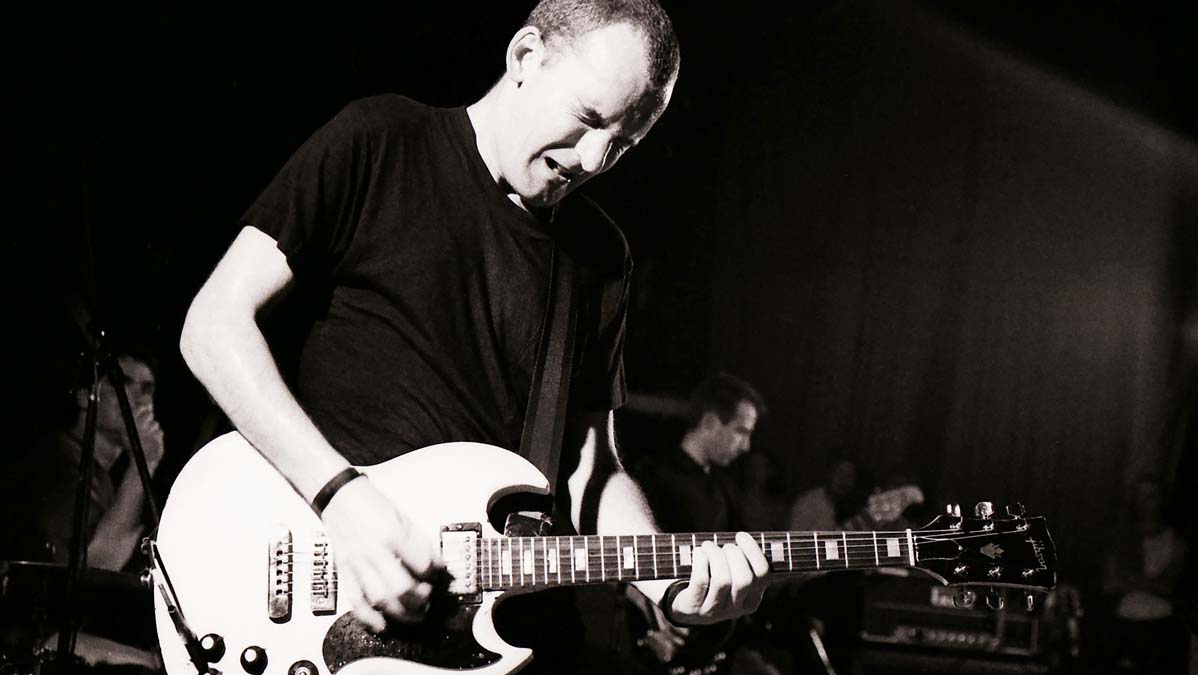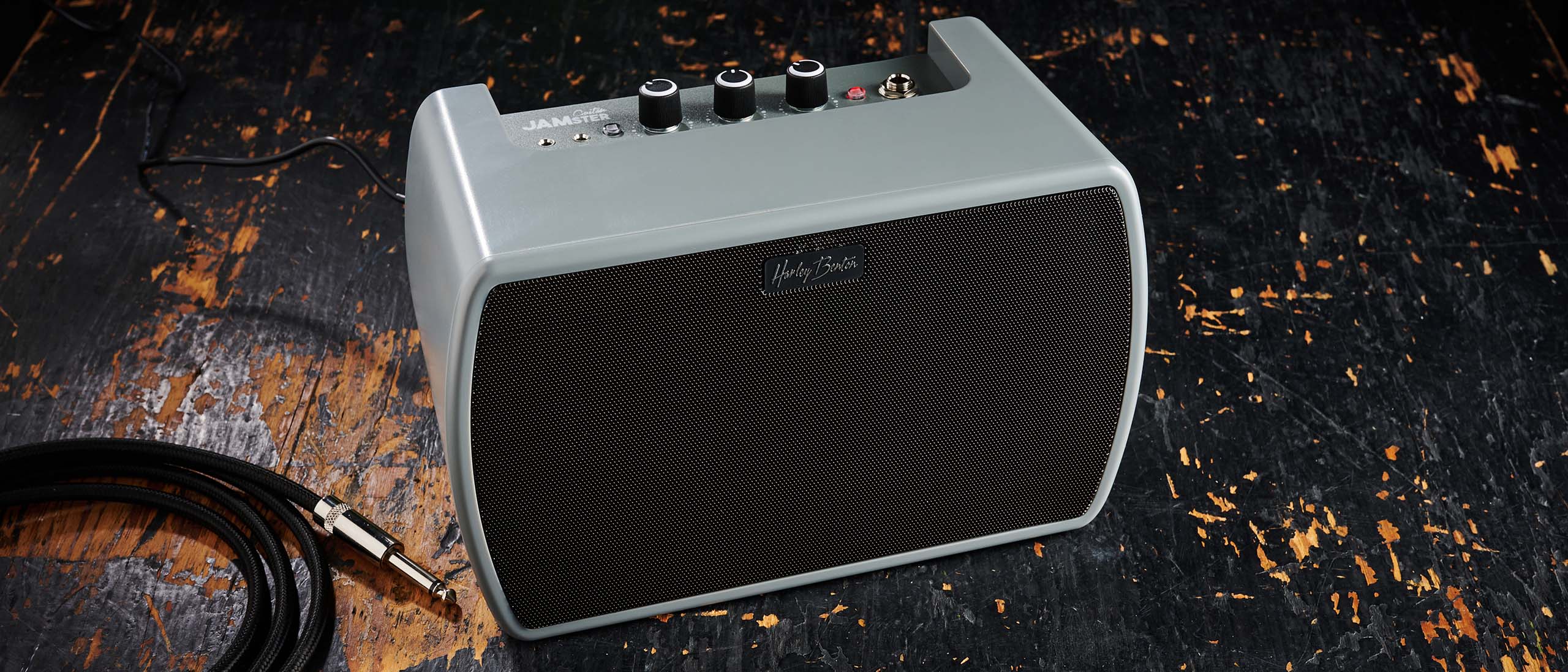Ian MacKaye: ”I probably should have been a horn player. I always hear horns, melodic lines, and try them with guitar”
The Fugazi punk trailblazer reflects on a change of sounds, change of amps, and the influence of Jimi Hendrix

Punk pioneer Ian MacKaye’s proudest guitar moments say a lot about his philosophy and aesthetic for the instrument.
Deep in the runtime of Instrument, the 1999 documentary about his legendary post-hardcore band Fugazi, MacKaye stands in front of his Marshall JCM 800 half-stack, conjuring caterwauling feedback from his alpine white Gibson SG during the breakdown of Promises, the closing song on 1989’s landmark 13 Songs [Dischord].
“There’s this moment where I do this chirping feedback thing,” MacKaye recalls. “It was really like I intended it and I knew what I was doing, and it got captured. And I’m like, ‘That’s what I’m talking about.’”
MacKaye doesn’t think far beyond wood and wire when it comes to guitars. In his 30-plus years of playing guitar in Fugazi, the Evens and now Coriky, his new band with wife Amy Farina and Fugazi bassist Joe Lally, he’s never used effect pedals. He only recently acquired an amplifier that has a channel switch.
His relationship with his instrument is so profound that it’s almost supernatural. You realize this person was a genius beyond measure
But out of that simplicity comes a maelstrom of sounds heard in the lockstep post-punk syncopation of Fugazi’s Repeater and the caustic tones of In On the Kill Taker [both on Dischord]. MacKaye manipulates volume and the proximity of his pickups to his amplifier, playing off the acoustics and resonant feedback of the room, and lets his hands do the rest.
“[I like] what happens electronically when you get [in] that space, and then using the toggle switch and bending a neck and making music out of it.” MacKaye traces his inspiration and sense of musical adventure to Jimi Hendrix, whose performance of “Villanova Junction Blues” at Woodstock made a deep impression on him as a kid.
“His relationship with his instrument is so profound that it’s almost supernatural,” he enthuses. “You realize this person was a genius beyond measure. Not that I could ever hope to play like that, but I like to think that I can be inspired by that kind of relationship with the instrument. And that’s how I’ve always approached my guitar playing. I’m just committed to making interesting sounds come out of it.”
Get The Pick Newsletter
All the latest guitar news, interviews, lessons, reviews, deals and more, direct to your inbox!
While he loved Hendrix and Seventies rock and funk titans like Ted Nugent, Queen and Parliament-Funkadelic, his musical language was originally piano, which he picked up as a kid growing up in the Washington, D.C., area.
“My whole orientation was around the piano, which had fixed locations,” he says. “Everything was shapes for me. I had a scale that I had written, like a blues kind of scale, based on a symmetry of the notes of the actual keys.
“When I started to play guitar, I couldn’t even begin to understand what a guitar was or how it worked, [or] how you made a chord on a guitar.”
He eventually gave up and focused on skateboarding with friends like Henry Garfield [later known as Henry Rollins]. When he was 16, he logged his first road miles by hopping a bus with Rollins and their skateboards to California.
As a creative exercise, what MacKaye learned through skateboarding had as much influence on his relationship with music and the guitar as Hendrix did.
“The thing about skating was, it teaches you how to redefine the world around you,” he continues. “You just take what’s given and make it work. You come to a parking lot and think, ‘All right, I can do this or that.’ If you see a piece of plywood on the side of the road, that’ll be a ramp. You see a swimming pool like, ‘I hope it gets empty.’”
MacKaye did actually once drain a hotel swimming pool by siphoning water through a garden hose in hopes of skating the bowl — but the hotel spoiled it all by filling it back up.
When punk rock came along, he found a musical movement that squared with his personal politics. He dove in with the Teen Idles and then hardcore pioneers Minor Threat, and co-founded Dischord Records to document the D.C. scene.
“I associate music with the counterculture,” he says, “with challenging conventional thinking, free expression, connectivity with human beings. That was missing for me in the mid -'70s.
“Though we loved hard rock, it was all very commercial and didn’t seem to have much to do with a counterculture at that point – or the only counterculture really seemed to be one of self-destruction. But then punk came along and it was suddenly like, ‘Yes, this is what I’m looking for.’”
MacKaye’s Minor Threat bandmate Brian Baker, now of Bad Religion, sold him an acoustic guitar for $20, and he started making power chords with the root and fifth. He played in short-lived projects like Egg Hunt and Embrace, as well as Pailhead, a collaboration with Ministry mastermind Al Jourgensen.
When he started jamming with bassist Joe Lally in 1986, they developed a musical bond that led to Fugazi, the influential D.C. quartet mythologized for its intense live performances, $5 shows and fiercely independent politics.
I associate music with the counterculture, with challenging conventional thinking, free expression, connectivity with human beings
Fugazi’s throbbing, dub-influenced basslines, roaring guitars, and the precise rhythmic interplay among MacKaye, Lally and drummer Brendan Canty were the foundation of the band’s anthemic sound.
All that volume is behind him, though, at least for now. Since Fugazi went on hiatus in 2002, he has sought mellower, cleaner guitar tones. Volume, as it turns out, can be political, too.
“Toward the end of Fugazi when we were gigging, because of the size of rooms we were playing, we were playing these really commercial venues that were just essentially bars,” he says. “Everything about them was counter revolutionary from my point of view. Imagine if you were a poet, and the only place you could speak your point was in crack dens. It’s an absurd idea, but it’s really what happened with music.”
When he and Farina formed the Evens and began gigging in the ’00s, they discovered they didn’t need ear-splitting volume to get their point across. MacKaye traded his SG and Marshall for a baritone Danelectro and a Fender Bassman to cover a wider spectrum of sound, and the duo sought out non-traditional venues to play for audiences who were there for the music.
Once, they played a puppet theater in Ypsilanti, Michigan. “When I turned down, I wasn’t having to shout over the music,” he says. “I could fool around with my ideas. I started to really get engaged in the textures of the notes. Those kinds of odd shapes really started to work differently. I could hear them.”
In Coriky, MacKaye builds on the rhythmic guitar style he established in Fugazi and cemented in the Evens, favoring single-note runs and octaves over open chords. The trio spent years playing together in the basement before recording their self-titled debut, which came out in June on Dischord.
That time allowed MacKaye and Lally to reassert their partnership. On album cuts like the bouncy “Say Yes” and “Clean Kill,” it’s impossible not to catch early Fugazi vibes, á la the danceable “Waiting Room” or “Suggestion.”
That isn’t to say MacKaye and Lally are repeating past glories – Coriky isn’t a retread of either Fugazi or the Evens, and MacKaye’s guitar playing has never been more melodic – but the pair is a known quantity, and Farina’s percussion holds it together naturally.
“I really like the lead figure on Would Coulda at the end,” he says about the languid closing track. “I have a lot of super-melodic ideas, [but] a lot of it gets trimmed off. I think I probably should have been a horn player. It’s all horns for me. I always hear horns, these melodic lines, and I try to do them with a guitar. It’s hard.”
MacKaye went back to playing his Alpine White and natural-finish SGs, a pair he acquired in the mid Eighties that have been broken and glued back together many times after onstage accidents.
When sweat from live performances caused the DiMarzio Super Distortion pickups that were installed at the treble position to fail, vintage-gear guru Steve Melkisethian replaced them with PRS Chainsaw pickups.
“With Coriky I went back to the guitar, [but] I didn’t want to play through a Marshall,” he says. “It wasn’t the right sound. I’m using a Fender Blues Deluxe. This time I have a channel switcher. It also has reverb on this thing – I occasionally use reverb, but that’s it. No pedals. I find pedals really distracting.”
I think music is sacred. It’s the form of communication that predates language
MacKaye’s relationship with music hasn’t changed since he started writing Minor Threat songs on piano and bass guitar four decades ago. Like the old days, Coriky maintains a near-daily practice regimen.
Sometimes they jam for hours, and sometimes they talk about music. But playing live and adhering to record-release promotional activities are afterthoughts when they happen at all. Creation is an end in itself.
“I make music – that’s what I do, and that’s my form of expression,” he says. “I think music is sacred. It’s the form of communication that predates language. It’s an art form that has been around forever. It’s attended virtually every important thing that’s ever happened in the history of the world.”
Jim Beaugez has written about music for Rolling Stone, Smithsonian, Guitar World, Guitar Player and many other publications. He created My Life in Five Riffs, a multimedia documentary series for Guitar Player that traces contemporary artists back to their sources of inspiration, and previously spent a decade in the musical instruments industry.
“The Beyoncé effect is, in fact, real. I got a lot of traffic just from people checking the liner notes”: With three Grammy wins and plaudits from John Mayer, Justus West is one of modern session guitar’s MVPs – but it hasn’t been an easy ride
“You might laugh a little. The post office shipped your guitar to Jim Root”: This metal fan ordered a new guitar from Sweetwater – but it ended up with the Slipknot guitarist




![John Mayer and Bob Weir [left] of Dead & Company photographed against a grey background. Mayer wears a blue overshirt and has his signature Silver Sky on his shoulder. Weir wears grey and a bolo tie.](https://cdn.mos.cms.futurecdn.net/C6niSAybzVCHoYcpJ8ZZgE.jpg)

![A black-and-white action shot of Sergeant Thunderhoof perform live: [from left] Mark Sayer, Dan Flitcroft, Jim Camp and Josh Gallop](https://cdn.mos.cms.futurecdn.net/am3UhJbsxAE239XRRZ8zC8.jpg)




